|
|
|
|
|
|
|
|
|
December 6, 2018 (Washington, DC).
U.S. Sen. Dan Sullivan (R-Alaska), chairman of the Subcommittee on Oceans,
 Atmosphere, Fisheries, and Coast Guard, will convene a subcommittee hearing titled "Preparing for Maritime Transportation in a Changing Arctic," at 9:30 am on Thursday. The hearing will examine emerging transportation issues in the changing Arctic region, including increases in vessel traffic and the resulting need for updates in waterway management, infrastructure investment, and domain awareness.
Witnesses (list subject to change):
- Mr. Willie Goodwin, Chairman, Arctic Waterways Safety Committee
- Andrew Hartsig, Director, Arctic Program, Ocean Conservancy
- Ms. Kathy Metcalf, President and CEO, Chamber of Shipping of America
- Captain Ed Page, Executive Director, Marine Exchange of Alaska
|
Media
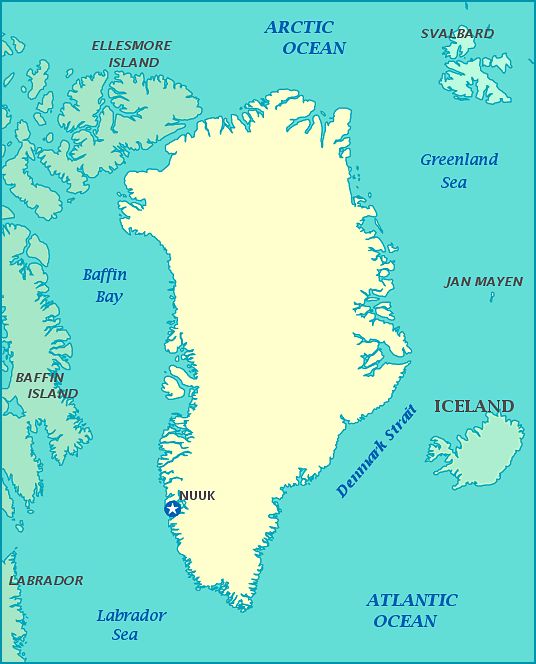 Greenland is Losing Ice at Fastest Rate in 350 Years. Greenland is Losing Ice at Fastest Rate in 350 Years. Ice melt across Greenland is accelerating, and the volume of meltwater running into the ocean has reached levels that are probably unprecedented in seven or eight millennia. The findings, drawn from ice cores stretching back almost 350 years, show a sharp spike in melting over the past two decades. Previous studies have shown record melting on parts of Greenland's ice, but the latest analysis includes the first estimate of historical runoff across the entire ice sheet. Nature
How to Write an Arctic Story in 5 Easy Steps. [Opinion] ( funny and true) So you've been assigned to write a story on the Arctic. Congratulations! This will be one of your easiest assignments. The key is to write the exact story your urban, mid-latitude reader expects to read. Stick to this formula and you'll be on the path to high click rates in no time. Arctic Today
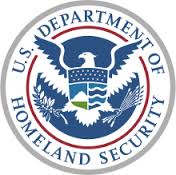 Snapshot: More Tests for Arctic Oil-spill Mapping Robot. Snapshot: More Tests for Arctic Oil-spill Mapping Robot. Environmental changes and economic incentives are transforming maritime activity in the Arctic region. As ice recedes and maritime activity increases, the Department of Homeland Security (DHS) is preparing for potential incidents involving oil and hazardous materials in U.S. Arctic waters through the U.S. Coast Guard. As the lead agency to plan for and respond to environmental threats under the National Oil and Hazardous Substances Pollution Contingency, the Service is addressing major challenges in spill response. Its focus is ensuring access to early and on-going information about the nature and magnitude of spills to help with effective cleanup. Department of Homeland Security
QIA, Feds Lay Groundwork for Inuit Benefits Deal on Marine Area. The federal government and the Inuit of Nunavut's Qikiqtani region are moving closer to settling the details of how Inuit will benefit from Nunavut's new national marine conservation area. Qikiqtani Inuit Association announced on Tuesday, Dec. 4 that it had signed an agreement-in-principle for the Tallurutiup Imanga Inuit Impact and Benefit Agreement on Oct. 30. Nunatsiaq Online
Lockheed-GeoNorth- University of Alaska Team Gets NGA Arctic Surveillance Support Contract. A team composed of Lockheed Martin, GeoNorth Information Systems and the University of Alaska Fairbanks will support the National Geospatial-Intelligence Agency's surveillance project in the Arctic region under a potential $15 contract. The Arctic GeoData Cooperative aims to create, monitor, update and maintain Arctic terrain elevation models for the NGA with the use of a geospatial processing technology, Lockheed said Wednesday. ExecutiveBiz 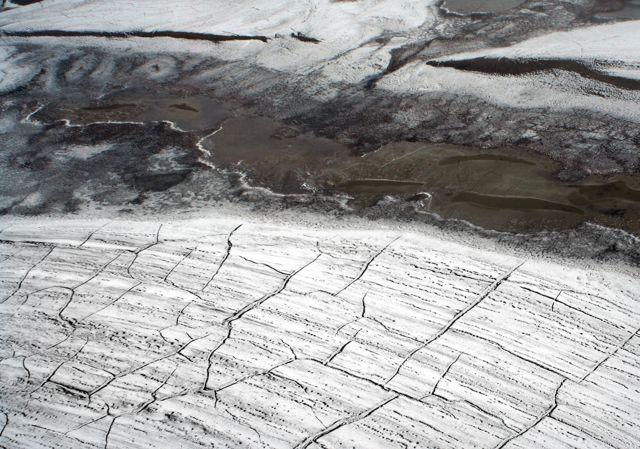
Record Levels of Mercury Released by Thawing Permafrost in Canadian Arctic. Permafrost thaw slumps in the western Canadian Arctic are releasing record amounts of mercury into waterways, according to new research by University of Alberta ecologists."We measured total mercury concentrations of up to 1,200 nanograms per litre," said Ph.D. student Kyra St. Pierre, a Vanier Scholar who co-led the study with fellow graduate students Scott Zolkos and Sarah Shakil. Phys.org Scientists Made a Surprising Discovery in the Arctic. The scientific staff of the Institute of petroleum Geology and Geophysics on the island of Sardis, over the Arctic circle was first discovered in rocks of the Neogene prints of leaves and fruits of thermophilic trees. From this we can conclude that millions of years ago, there were deciduous forests.During the expedition to the Delta of the Lena river scientists went to the island of Sardis, to study the breakdown of the Neogene (23-2. 5 million years) and Quaternary rocks. In the course of work researchers have discovered in the rock a good set of leaves of beech, willow, alder and sycamore, and fruit of Magnolia, which, as noted in the Institute, "is a sensation," reports RIA Novosti. The Siver Week
Empowering Arctic Indigenous Scholars and Making Connections - Call for Applicants. ARCUS and the Inuit Circumpolar Council Alaska (http://iccalaska.org/) invite applications from and/or nominations of Arctic Indigenous scholars to travel to Washington D.C. and meet with officials at U.S. government agencies, non-governmental organizations, and other groups. Four selected scholars will be able to share their interests via a seminar and meetings, learn of available resources, build toward collaborative relationships, and provide on-the-ground perspectives to key decision-makers. For the purposes of this opportunity, scholars are defined as an expert within their own knowledge system. This includes hunters, fishers, and gatherers; those that process and store food; health aides; and others. It includes youth, elders, and adults. Education may come from the land, the water, or a classroom. To apply for the 2019 opportunity, or to nominate a scholar, please visit the webpage for instructions at https://www.arcus.org/indigenous-scholars. Applications are due by 5:00pm AKST, Thursday, 10 January 2019. Letters of nomination are due by Friday, 28 December 2018.
|
|
Future Events
American Geophysical Union Fall meeting, December 10-14, 2018 (Washington, DC USA). The AGU 2018 Fall Meeting will mark another dynamic year of discovery in Earth and space science, serve as the advent of AGU's Centennial year, and provide a special opportunity to share our science with world  leaders in Washington, D.C. As the largest Earth and space science gathering in the world, the Fall Meeting places you in th e center of a global community of scientists drawn from myriad fields of study whose work protects the health and welfare of people worldwide, spurs innovation, and informs decisions that are critical to the sustainability of the Earth.
ArcticNet: Annual Scientific Meeting 2018, December 10-14, 2018 (Ottawa, ON Canada). Canada's North is experiencing unprecedented change in its sea and terrestrial ice, permafrost and ecosystems under the triple pressures of climate change, industrialization and modernization. The impacts of these pressures can be seen on food and energy security, shipping, sovereignty, northern community health and well-being, and sustainable development and resource exploitation. All these issues have brought the North to the forefront of national and international agendas. Building on the success of its previous Annual Scientific Meetings and International Arctic Change Conferences, the Arctic Network of Centers of Excellence announces the 14th ArcticNet Annual Scientific Meeting.
USARC Commissioner Jacqueline Richter-Menge to deliver the Nye Lecture at the 2018 AGU Fall Meeting, December 11, 2018 (Washington, DC USA).The US Arctic Research Commission (USARC) is pleased to announce that Commissioner Jacqueline Richter-Menge will present this year's Nye Lecture, titled "A Career of Change," at the Fall Meeting of the American Geophysical Union (AGU) in Washington, DC at 2:50 pm on Tuesday, December 11, 2018 in the Marquis room of the Marriott Marquis Hotel, 901 Massachusetts Ave. NW, Washington, DC 20001.
** New this week ** Arctic Report Card Release, December 11, 2018 (Washington, DC USA). The National Oceanic and Atmospheric Administration 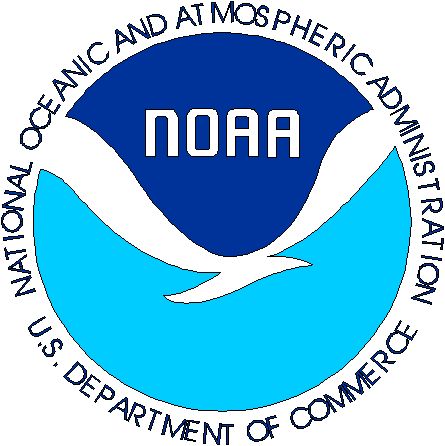 (NOAA) is expected to release the 2018 Arctic Report Card during the American Geophysical Union (AGU) annual fall meeting. A press conference of the release will be steamed live on the AGU press events webpage- see here. The 2018 Arctic Report Card brings together the work of more than 80 scientists from 12 nations to provide the latest information on Arctic environmental change, including air and sea surface temperature, sea ice, snow cover, the Greenland ice sheet, vegetation and the abundance of plankton at the base of the marine food chain. This year's peer-reviewed report led by the U.S. National Oceanic and Atmospheric Administration will also include special reports on the health of caribou and reindeer populations, harmful algal blooms, microplastic pollution, and connections between Arctic weather patterns and severe weather in the more populous mid-latitudes. (NOAA) is expected to release the 2018 Arctic Report Card during the American Geophysical Union (AGU) annual fall meeting. A press conference of the release will be steamed live on the AGU press events webpage- see here. The 2018 Arctic Report Card brings together the work of more than 80 scientists from 12 nations to provide the latest information on Arctic environmental change, including air and sea surface temperature, sea ice, snow cover, the Greenland ice sheet, vegetation and the abundance of plankton at the base of the marine food chain. This year's peer-reviewed report led by the U.S. National Oceanic and Atmospheric Administration will also include special reports on the health of caribou and reindeer populations, harmful algal blooms, microplastic pollution, and connections between Arctic weather patterns and severe weather in the more populous mid-latitudes.
** New this week ** First Results From NASA's New Ice-Measuring Space Laser, December 11, 2018 (Washington, DC USA). Glacier crevasses, cracks in sea ice and forest canopies - the first height data from NASA's Ice, Cloud and land Elevation Satellite-2 are so clear that scientists can easily distinguish these and other features of Earth's surface. At this press conference, scientists will present the first results and new data visualizations from ICESat-2, which launched Sept. 15. They'll discuss how the airborne Operation IceBridge campaign led into ICESat-2 and how the satellite's seasonal measurements of changing ice sheets and sea ice will lead to better understanding of sea level rise and global weather and climate patterns.
** New this week ** Keynote: US Senate Perspectives on Science Policy, December 12, 2018 (Washington, DC. USA). U.S. Senators Lisa Murkowski of Alaska and Maria Cantwell of Washington will discuss today's top science policy topics, from hazards to scientific integrity. The senators will be sharing remarks on the science policy issues facing their constituents and the world, followed by a Q&A moderated by AGU CEO and Executive Director Chris McEntee. This event is part of the American Geophysical Union Fall Meeting.
** New this week ** The Synoptic Arctic Survey Informational Meeting During the AGU Fall Meeting, December 13, 2018 (Washington, DC USA). The Synoptic Arctic Survey (SAS) will be hosting an informational meeting during the American Geophysical Union (AGU) 2018 Fall Meeting. This open meeting will convene 12:30 - 1:30 p.m. Eastern Standard Time on Thursday, 13 December 2018 at the Cambria Hotel Washington D.C. Convention Center (899 O Street NW, Washington, DC, 20001), Duke Ellington Room 1, in Washington D.C. The SAS is a developing international program envisioned to mount a coordinated, multi-nation, oceanographic field-based effort on a Pan Arctic Scale quasi-synoptically over a single season to achieve the baseline understanding of the fundamental structure and function of the linked carbon-ecosystem-physical systems that will permit detection of ongoing and future changes. Development of the program has been ongoing since 2015.
** New this week ** Fast Thaw, December 14, 2018 (Washington, DC USA). Arctic 21 will host a presentation with Dr. Katey Walter Anthony. The discussion with consider permafrost thaw and methane emissions from lakes in the Arctic.
'UK-US Maritime, Aerospace and Security Cooperation in the Arctic'. Delegates will discuss and debate trade and security-focused Arctic collaboration in the Arctic between US, the UK, and their allies. This convening is designed to deepen the UK-US special relationship by strengthening trade and cooperation in four areas in particular: maritime services, aerospace, fisheries, defense and security. The Arctic Encounter London is co-produced by the Polar Research and Policy Initiative and the Arctic Encounter. The Polar Research and Policy Initiative (PRPI) is a London-based international think-tank dedicated to Arctic, Nordic, North Atlantic, North Pacific and Antarctic affairs. The Arctic Encounter is the largest annual Arctic policy and business conference convening in the United States, with partnerships and convening efforts worldwide.
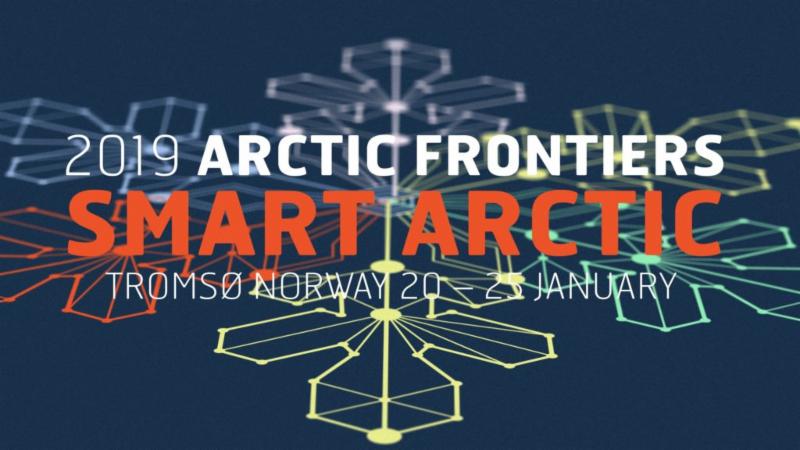 Arctic Frontiers, January 20-25, 2019 (Tromso, Norway). The Arctic Frontiers is a global scientific conference on economic, societal, and environmental sustainable growth. This year's theme will be "Smart Arctic," with a pan-arctic emphasis, and an effort to build new partnerships across nations, generations and ethnic groups. Arctic Frontiers provides a forum for dialogue and communication between science, government and industry. The plenary program will have five main sessions: State of the Arctic, Blue Growth, Smart Solutions, Bridging the Gap, and Arctic business prospects. An abstract-driven science program will address Plastics in the Ocean, the Future of Governance and Handling Vulnerability in Arctic Ecosystems, State of the Arctic and A Smart Arctic Future.
Save the Date! 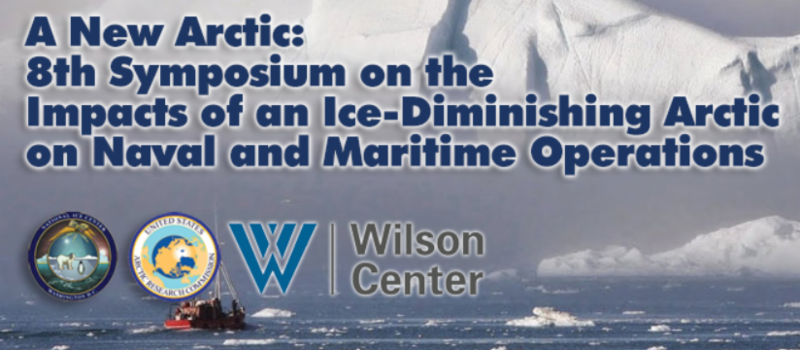
Mark your calendars to attend IDA-8, which some have called one of the best Arctic gatherings around. Historically, this biennial symposium was co-hosted by U.S. National/Naval Ice Center (NIC) and the US Arctic Research Commission (USARC). In 2019, these partners will join forces with the preeminent Wilson Center's Polar Institute, as a third co-host. The now 2-day symposium will be held in the Ronald Reagan Building Amphitheater, in Washington, DC. The event will focus on a broad cross-section of naval and maritime operations and issues in an ice-diminishing Arctic. The symposium brings together nationally and internationally recognized experts on Arctic governance, geopolitics, marine operations, infrastructure, science, and environmental observations, from the local, regional, and pan-Arctic scale. Information on prior symposia, including lists of speakers, video clips, and copies of presentations, is available here. Attendance is free, and registration will begin in Spring 2019. The event will be webcast live, and video recorded.
 of the AAG includes over 8,500 geographers converging from the U.S., Canada, and nearly 60 other countries in a typical year including geographers, GIS specialists, environmental scientists, and other leaders for the latest in research and applications in geography, sustainability, and GIScience. of the AAG includes over 8,500 geographers converging from the U.S., Canada, and nearly 60 other countries in a typical year including geographers, GIS specialists, environmental scientists, and other leaders for the latest in research and applications in geography, sustainability, and GIScience.
|
|

  
4350 N. Fairfax Drive, Suite 510
Arlington, VA 22203, USA
External links in this publication, and on the USARC's World Wide Web site ( www.arctic.gov) do not constitute endorsement by the US Arctic Research Commission of external Web sites or the information, products or services contained therein. For other than authorized activities, the USARC does not exercise any editorial control over the information you may find at these locations. These links are provided consistent with the stated purpose of this newsletter and the USARC Web site.
|
|
|
|
|
|
|
|
|